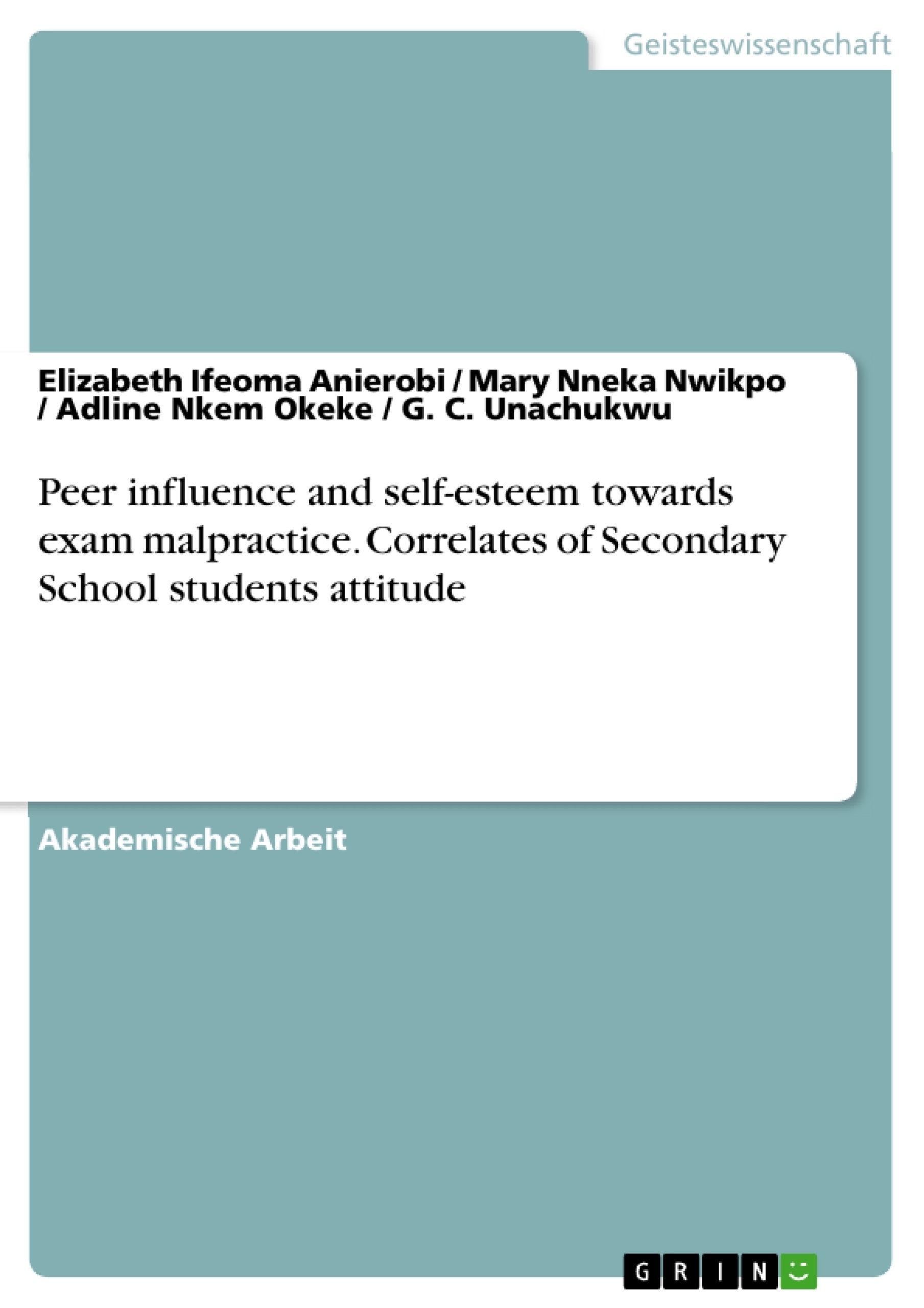The paper deals with the question how peer influence and self-esteem of secondary school students relate to their attitude towards examination malpractice in Anambra State. A total of 1300 SS2 students from the population of 8,978 SS2 students in the 174 co-educational public secondary schools in Anambra State made up the sample for the study. The correlation survey design is adopted for the study. Data are analyzed and hypotheses tested using Pearson Product Moment Correlation Coefficient.
Examination malpractice a reoccurring decimal in Nigerian education system has often been blamed on peer influence and self-esteem which in one or the other play role in shaping the attitude of students. Report released by Exam Ethics Marshal International (2013) that Anambra State ranked 3rd state in the south-east zone and 13th state in Nigeria with the highest rate of examination malpractice. These days, the situation seems to be that majority of the students in Anambra State irrespective of age, gender, family background and school environment indulge in one form of examination malpractice or the other. This could imply that they seem to lack the virtue and value of hard work in terms of study. It is no longer news that students skip lessons at will, lack effective study habits, goal setting and time management skills and consequently they violate examination rules and regulations at unprecedented rates in order to make academic ends meet. Some of them vandalize principals’ offices to mutilate results, get suspended or expelled from school, and end up as societal nuisance.
Inhaltsverzeichnis
- Abstract
- Introduction
- Research Questions
- Hypotheses
- Method
- Instrument for Data Collection
- Method of Data Analysis
- Result and Discussion
- Research Question One
- Research Question Two
- Hypothesis One
- Hypothesis Two
- Discussion of Findings
- Conclusion/Implication of the Study
- Recommendations
- REFERENCES
Zielsetzung und Themenschwerpunkte
Diese Forschungsarbeit untersucht den Zusammenhang zwischen Peer-Einfluss und Selbstwertgefühl sowie der Einstellung von Sekundarschülern in Anambra State zu Prüfungsbetrug. Das Hauptziel ist es, das Ausmaß des Einflusses von Peer-Gruppen und dem Selbstwertgefühl auf die Einstellung von Schülern zum Prüfungsbetrug zu analysieren.
- Der Einfluss von Peer-Gruppen auf die Einstellung von Schülern zum Prüfungsbetrug
- Die Rolle des Selbstwertgefühls in Bezug auf die Einstellung von Schülern zum Prüfungsbetrug
- Faktoren, die die Einstellung von Schülern zum Prüfungsbetrug beeinflussen
- Die Auswirkungen von Prüfungsbetrug auf die Bildung in Anambra State
- Strategien zur Reduzierung von Prüfungsbetrug in Anambra State
Zusammenfassung der Kapitel
Die Einleitung stellt das Problem des Prüfungsbetrugs im nigerianischen Bildungssystem dar und hebt die Rolle von Peer-Einfluss und Selbstwertgefühl bei der Gestaltung der Einstellung von Schülern hervor. Die Forschungsfragen und Hypothesen werden vorgestellt, die das Forschungsdesign und die verwendeten Methoden beschreiben.
Das Kapitel "Result and Discussion" präsentiert die Ergebnisse der Datenanalyse und diskutiert die Ergebnisse im Kontext der Literatur. Die Schlussfolgerung fasst die wichtigsten Ergebnisse zusammen und diskutiert die Implikationen der Studie für die Praxis. Empfehlungen für zukünftige Forschung und Interventionen werden gegeben.
Schlüsselwörter
Die wichtigsten Schlüsselwörter und Themen der Arbeit sind Peer-Einfluss, Selbstwertgefühl, Einstellung, Prüfungsbetrug, Sekundarschüler, Anambra State, Nigeria. Die Studie untersucht die Korrelation zwischen Peer-Einfluss und Selbstwertgefühl und der Einstellung von Schülern zu Prüfungsbetrug in Anambra State. Die Ergebnisse der Studie könnten zur Entwicklung von Interventionen beitragen, die darauf abzielen, die Einstellung von Schülern zu Prüfungsbetrug zu verbessern.
Häufig gestellte Fragen
Was ist das Hauptziel dieser Forschungsarbeit?
Die Arbeit untersucht den Zusammenhang zwischen Peer-Einfluss, Selbstwertgefühl und der Einstellung von Sekundarschülern zu Prüfungsbetrug in Anambra State, Nigeria.
Welche Stichprobe wurde für die Studie verwendet?
Insgesamt nahmen 1.300 SS2-Schüler aus 174 öffentlichen koedukativen Sekundarschulen in Anambra State an der Untersuchung teil.
Welche Rolle spielt der Peer-Einfluss laut der Studie?
Die Studie analysiert, inwieweit Gleichaltrigengruppen die Einstellung der Schüler zum Prüfungsbetrug formen und beeinflussen.
Wie hängen Selbstwertgefühl und Prüfungsbetrug zusammen?
Es wird untersucht, ob ein niedriges oder hohes Selbstwertgefühl mit einer positiven oder negativen Einstellung zu unlauteren Prüfungspraktiken korreliert.
Welche Auswirkungen hat Prüfungsbetrug in Anambra State?
Prüfungsbetrug wird als Hindernis für die Tugend harter Arbeit gesehen und kann zu schwerwiegenden Konsequenzen wie Schulausschlüssen oder einer Entwertung des Bildungssystems führen.
Welche methodische Herangehensweise wurde gewählt?
Die Forscher verwendeten ein Korrelations-Umfragedesign und analysierten die Daten mit dem Pearson Product Moment Correlation Coefficient.
- Citation du texte
- Elizabeth Ifeoma Anierobi (Auteur), Mary Nneka Nwikpo (Co-auteur), Adline Nkem Okeke (Co-auteur), G. C. Unachukwu (Co-auteur), 2018, Peer influence and self-esteem towards exam malpractice. Correlates of Secondary School students attitude, Munich, GRIN Verlag, https://www.grin.com/document/505325



